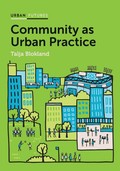Community as Urban Practice
Polity Urban Futures

1. Auflage März 2017
200 Seiten, Softcover
Wiley & Sons Ltd
Kurzbeschreibung
Community is a central idea in urban studies but remains conceptually vague and empirically difficult to work with. Building on existing theories of community, Talja Blokland offers an important contribution to defining and understanding this key theme.
Blokland argues that there has been too much focus on community as a stable construct, formed by durable relationships with kin, friends, social groups or neighbours. She draws attention to the non-durable, fluid encounters that constitute community, theorizing communities as shared urban practices in a globalizing world. The book proposes two core ways of thinking about community: the dimension of familiarity, defined by our ability to construct identities, and the dimension of access, defined by our freedom to enter and leave urban spaces. These dimensions form various urban configurations which enable us to experience and practise community in diverse ways. As this book maintains, community is after all an urban practice, not a fixed state of affairs.
Community is a central idea in urban studies but remains conceptually vague and empirically difficult to work with. Building on existing theories of community, Talja Blokland offers an important contribution to defining and understanding this key theme.
Blokland argues that there has been too much focus on community as a stable construct, formed by durable relationships with kin, friends, social groups or neighbours. She draws attention to the non-durable, fluid encounters that constitute community, theorizing communities as shared urban practices in a globalizing world. The book proposes two core ways of thinking about community: the dimension of familiarity, defined by our ability to construct identities, and the dimension of access, defined by our freedom to enter and leave urban spaces. These dimensions form various urban configurations which enable us to experience and practise community in diverse ways. As this book maintains, community is after all an urban practice, not a fixed state of affairs.
1 Introduction
2 Traditions of Theorizing Community
3 Community as Culture
4 Engagements, Encounters, Social Ties
5 Relational Settings of Belonging
6 Practices of Exclusion
7 Conclusion
References
John Mollenkopf, Graduate Center, City University of New York
"Talja Blokland's beautful book explains why the search for community retains its importance into the twenty-first century. She provides a wonderful, comprehensive overview of recent research to show that communities are not a nostalgic throwback, but continue to matter as they are produced by ongoing social ties, symbolic identities, and struggles."
Mike Savage, London School of Economics and Political Science
"From fluid relations to ritualized, hierarchical performances, Blokland draws on a wide range of cases to show that "community" is neither homogeneous nor permanent, yet it remains a focus of longing in an anxious, urban world. Humans perform community to define society: an effort to find a place between intimacy and anonymity, the public and the private, the home and the world."
Sharon Zukin, Brooklyn College and Graduate Center, City University of New York


